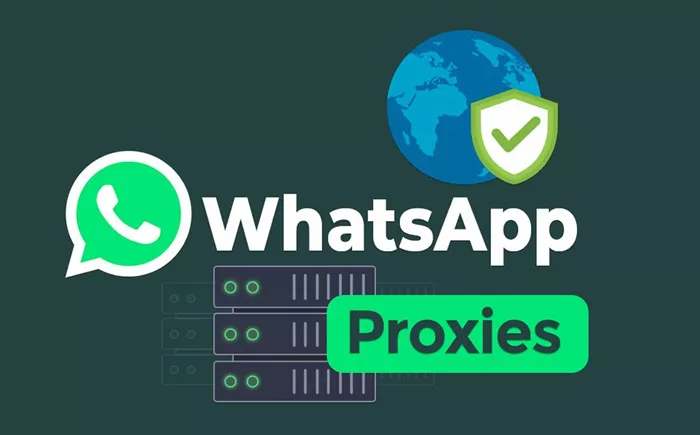WhatsApp is one of the most popular messaging platforms in the world. In certain regions, access to WhatsApp may be restricted or blocked due to various reasons such as government regulations or network limitations. In such cases, using a proxy can help users maintain access to the app. This guide explains how to find a proxy address for WhatsApp and how to use it effectively to ensure uninterrupted communication.
What is a Proxy for WhatsApp?
A proxy server acts as an intermediary between your device and the internet. When you connect to WhatsApp through a proxy, your connection is routed through the proxy server rather than going directly to WhatsApp servers. This can help bypass network restrictions and maintain privacy.
Why Use a Proxy for WhatsApp?
There are several reasons why you might need a proxy for WhatsApp:
- Bypass network restrictions – Useful in regions where WhatsApp is blocked.
- Enhance privacy – Masks your IP address from prying eyes.
- Access during outages – When direct connection fails, proxies may work.
How to Find a Proxy Address for WhatsApp
1. Check WhatsApp’s Official Recommendations
WhatsApp has started supporting proxy connections officially. Visit WhatsApp FAQ to see if they provide updated proxy server addresses for your region. These addresses are often hosted by volunteers or trusted organizations aiming to help users access the app securely.
2. Search Trusted Online Sources
Look for proxy addresses shared by reputable tech websites or privacy advocacy organizations. Many of these sites maintain lists of free proxy servers that support WhatsApp. Be sure to verify the credibility of the source before using a proxy address from the internet to avoid potential security risks.
3. Ask Communities and Forums
Online forums such as Reddit or specialized tech communities often discuss proxy addresses for WhatsApp. Search within relevant threads or create a new post asking for recommendations. Always double-check the proxy address provided to ensure it is safe.
4. Use Social Media Networks
Follow tech activists or digital freedom organizations on social media platforms. These groups sometimes share working proxy addresses during service outages or restrictions to help users stay connected.
Steps to Set Up a Proxy on WhatsApp
1. Obtain the Proxy Address
After finding a suitable proxy address, make sure to note down both the IP address and port number if available. This information is essential for configuration.
2. Open WhatsApp Settings
Launch WhatsApp on your device. Navigate to Settings, then select Storage and Data. From there, choose Proxy.
3. Enter the Proxy Information
Enable the proxy option and enter the proxy address along with the port number. Save the settings and return to your chats. WhatsApp will attempt to connect via the specified proxy server.
4. Confirm the Connection
Once connected, you should see a confirmation within WhatsApp indicating that you are using a proxy server. If the connection fails, double-check the proxy details or try a different proxy address.
Considerations When Using a Proxy
1. Security
Always use proxy addresses from trusted sources. Malicious proxy servers can intercept your data, so it is crucial to verify the integrity of any server you connect to.
2. Speed
Proxy servers can sometimes slow down your connection depending on their location and capacity. If you notice significant delays, switch to another proxy address.
3. Privacy
While proxies can mask your IP address, they do not encrypt your messages. WhatsApp’s end-to-end encryption still applies, but data between your device and the proxy server could potentially be logged by the proxy operator. Choose reliable servers to minimize this risk.
How to Verify a Proxy Address
1. Ping the Proxy
You can use built-in tools on your device to check if the proxy server is active. A successful ping indicates the server is online and reachable.
2. Test Connectivity
Once you configure the proxy on WhatsApp, send a few messages to verify that they are delivered. If they fail, the proxy may not support WhatsApp traffic or could be down.
Where to Find Reliable Proxy Lists
1. Digital Rights Organizations
Organizations that promote internet freedom often provide lists of reliable proxies during service disruptions. Examples include Access Now and similar groups.
2. Tech News Websites
During significant WhatsApp outages or blocks, major tech websites may publish lists of verified proxy servers. These are generally safe to use and easy to find.
Tips for Staying Safe with WhatsApp Proxies
1. Change Proxy Periodically
To avoid detection or blacklisting, consider changing your proxy server occasionally. This also helps if a particular server becomes slow or blocked.
2. Avoid Public Proxy Lists
Proxy lists that are widely circulated online may be unreliable or even harmful. Stick to sources that you trust.
3. Keep WhatsApp Updated
Ensure you have the latest version of WhatsApp to benefit from any security improvements and official proxy support updates.
Alternative Solutions
1. Virtual Private Networks
In addition to proxies, VPNs are a popular choice for bypassing restrictions. They offer encryption and can be easier to set up.
2. Tor Network
For highly censored regions, using WhatsApp over the Tor network might be an option, though this requires additional configuration.
Conclusion
Finding a proxy address for WhatsApp is essential when facing access restrictions. Always prioritize safety and reliability when selecting a proxy server. Use trusted sources, test the connection carefully, and remain aware of the limitations of proxies in protecting your privacy. With the right setup, you can continue using WhatsApp even in challenging network conditions.


